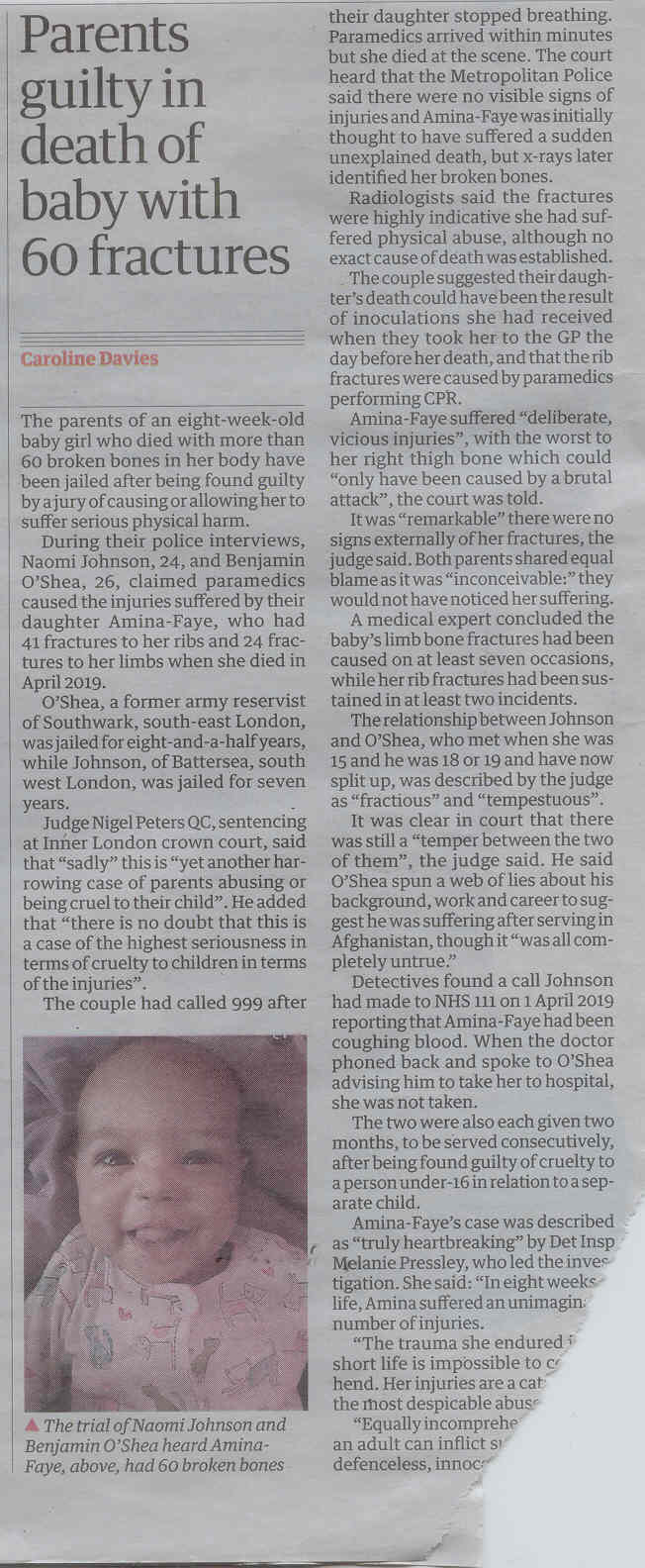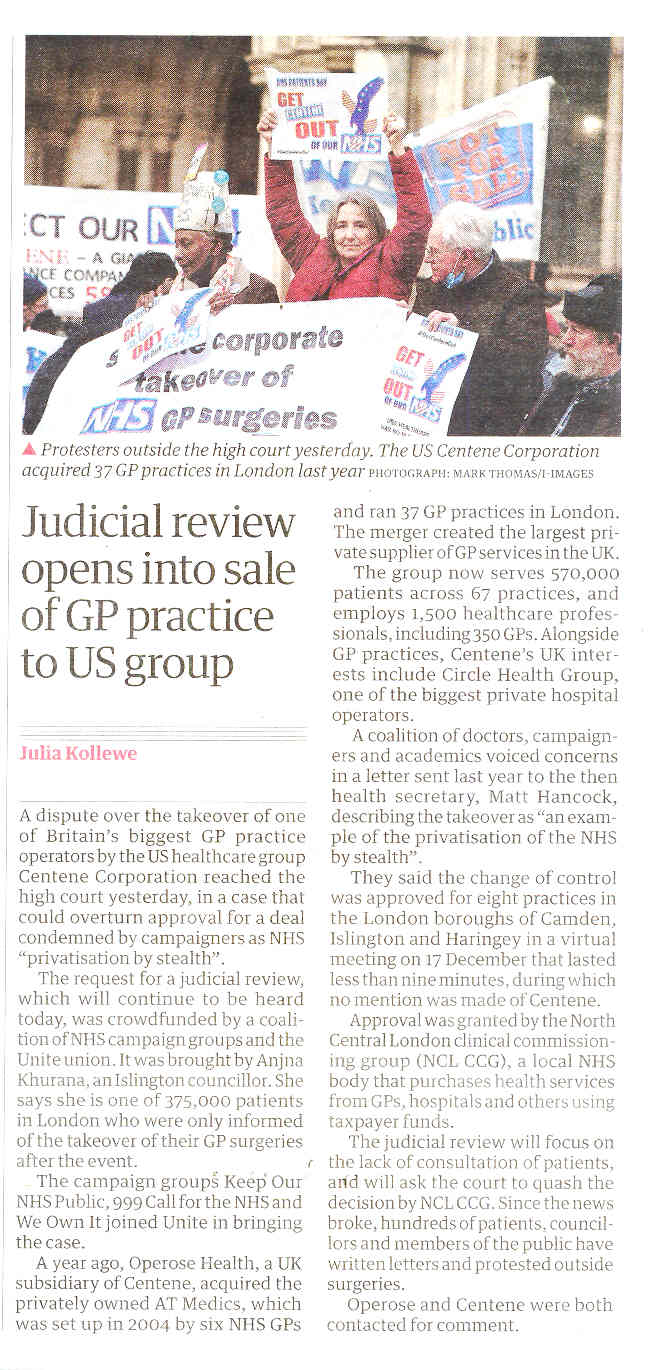
Latest developments
Boris does seem to have a few dificulties-are cparties that important? As long as no party goer receives NHS treatment-not so important: because of these difficulties-now would be the best time for MPs to vote with their consciences and abort the Health and Social Care bill, introduce a workforce planning exercise to increase doctors, nurses, midwives...
Boris seems to be rushing through bad legislation to boster his supporting MPs-the Health and Social Care Act
and Javids "Academy Trust Hospitals to be leased off or sold to United Health, Centene et al
(Ceasing the BBC seems a bad idea...
Abandoning Covid regulations seems a bad idea...
Surrendering to the EU, France seems a bad idea... selling out our farmers,
fishermen ditto...)
The Health and Social bill should set off alarm bells
Allyson Pollock and Peter Roderick The government is easing the way for the
privatisation of the health service – where is the opposition to their
plans?
“Over the last three decades, the funding, planning and provision of health
services have become disconnected from each other and from people living in
local areas”
Allyson Pollock and Peter Roderick The government is easing the way for the
privatisation of the health service – where is the opposition to their
plans?
Ten years ago, Andrew Lansley’s health and social care bill to reorganise
the NHS in England faced enormous opposition. The current health and care bill,
which has its second reading in the House of Lords today, has received far less
attention. But it is no less significant. The new bill will continue the dismantling
of the NHS, this time by adopting more features from the US health system. For
anyone who cares about the NHS, this should set off alarm bells.
The proposals mean that for the first time since 1948, parliament will not determine
to whom NHS services must be provided. The bill removes the requirement for
emergency services to be provided for everybody present in an area. No explanation
has been given for getting rid of it.
Over the past three decades the funding, planning and provision of health services
have become disconnected from each other and from people living in local areas.
The bill takes this further. It gives a single budget pot to 42 new integrated
care boards (ICBs) to commission most health services. These won’t serve
all people living in a local area, but a “group of people” who can
be drawn from anywhere in England. The group will be allocated to the ICB under
rules made by NHSEngland, without parliamentary process.
Each ICB will have “core responsibility” for its group of people.
This new concept closely resembles the US definition of a health maintenance
organisation (HMO). In the US, contrary to popular perception, the government
funds most healthcare, much of it through private health companies such as HMOs
and other “managed care organisations”. These are responsible only
for providing limited free services to a group of people who enrol as their
“members”, not a local population. They provide a core or basic
package of care paid for under a health plan. Additional services are paid for
through more insurance or user charges.
US private health companies such as Centene (Operose) and UnitedHealth (Optum
Health) offer publicly funded health plans in the US, and already operate in
the NHS. After a takeover earlier this year, Centene became one of the largest
primary care providers in England, with 58 practices and more than 500,000 patients.
Within weeks of the deal, Samantha Jones, the CEO of Centene in the UK, had
resigned and was appointed Boris Johnson’s health adviser. UnitedHealth
has received a range of NHS contracts for more than a decade, and in 2019 Optum
was one of two companies awarded a four-year prescribing support contract up
to £100m. The chief executive of NHS England was until recently Simon
Stevens, the former vice-president of UnitedHealth. Stevens became a peer this
year, and the bill is his brainchild.
Advertisement
After a weasel-worded amendment from the government, which failed to rule out
private companies sitting on the ICBs or their committees, the new bill will
still allow these multinationals, together with private health insurance companies
such as Bupa and Spire, to join the ICBs. These ICBs will decide how the budget
should be distributed.
Still, despite the focus on ICBs, much of the real power and decision-making
will lie with four groups that already exist but are not mentioned in the bill:
provider collaboratives, place-based partnerships, primary care networks, and
companies accredited to the Health System Support Framework. Provider collaboratives
are groups of public and private providers that NHS England has said will be
responsible for designing services. ICBs will be able to delegate their functions
to them. The bill also proposes that commissioning contracts can include “discretions
… in relation to anything to be provided under” the contracts. In
practice this will allow providers to decide what, where and how services will
be provided. So much for our so-called rights under the NHS constitution.
More than 40 collaboratives are listed on the NHS England website, including
several private companies such as Cygnet, Priory and Elysium. There are echoes
here again of the US. In the byzantine US healthcare system, private insurance
companies sell health plans to individuals, some of whom may be eligible for
public funding. The private insurance companies enter contracts with a limited
number of providers to buy services for their plan members, known as “provider
networks”. An ICB will be able to operate similarly, with similar effects,
for its group of people. The Northern Care Alliance is already reported to be
doing this. In effect, this leaves the principle of a universal and comprehensive
NHS in tatters.
And let’s not forget the many private companies already accredited to
the health system support framework, including Atos, Capita, Operose, Deloitte,
Ernst & Young, McKinsey, PWC, Serco and Optum. The bill says nothing about
these, but they will be providing population health management, digital and
other support services. In other words, the private sector will be present at
every level of the health service.
This isn’t a plan for social care in England – it’s a recipe
for disaster
Polly Toynbee
Read more
These changes and more build on three decades of incremental chipping away by
successive governments at the founding principles of the NHS as a universal
and comprehensive service based on public funding, accountability and ownership.
In the wake of the pandemic, the public is being softened up to expect fewer
NHS-funded services and to be pushed into paying for them. Already, the NHS-partnered
patient accesswebsite for GP appointments, repeat prescriptions and “discovering
local health services” is reportedly offering mostly private healthcare
with lists of tests and treatments to be paid for.
Any National Health Service requires enough surgeons, doctors, nurses and midwives: they need respite from burnout. Recruit more, train more, retain more- do not drive them out, drive them to retire, take early retirement, reduce hours, change career, change country…
The NHS gives the most equitable, best outcome, least expensive as long as it is not starved of funding.
Private profiteers corporations have.a duty to maximise profits for their CEOs, directors, and shareholders- not to the patient
They do this by deselecting non profitable patients, reducing treatment, siphoning out into “the community”-which is overstretched, under resourced, too few GPs, social care workers: a staff crisis.
Academy Trust Hospitals are very suspect- can they be sold off, leased to UnitedHealth, Centene? They should belong to the State- not hedge funds or massive insurers
Independent treatment centres get sweeteners, discard complex patients, free indemnity, and poach staff from the real NHS, do no training, simply steal!
Outsourced Covid testing, pathology labs cut costs, loose highly respected staff
The Labour Party still prefer to marketise, privatise: Why are they cowards, failing to grab the initiative and promote a comprehensive Health service
Abort the 2012 Lansley Monster Act
Pass the Reinstate the NHS David Owen Act
Abort the 2021 Health and Social Care Act
Then pause to make the decision to like the NHS, fund it well, and let
the superb ethos driven staff perform and increase care and treatment- in state
owned and built NHS hospitals, with an NHS run Social Care system, properly
staffed, resourced, and valued.
https://labourhub.org.uk/2021/11/23/why-we-must-oppose-the-health-and-care-bill/

